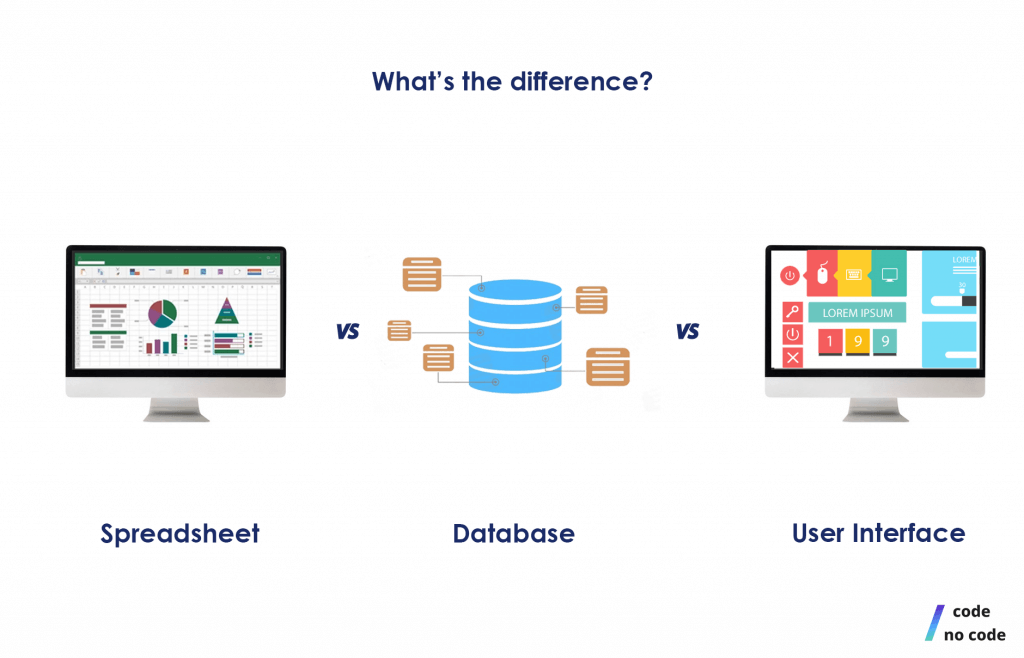No-Code Open Platform Data Source Development: Simplify Facility Growth Tasks
No-Code Open Platform Data Source Development: Simplify Facility Growth Tasks
Blog Article
Checking Out the Advantages of Scalable Data Sources That Need No Coding Skills for Reliable Data Administration Solutions
The development of scalable data sources that get rid of the need for coding skills provides a transformative chance for companies seeking efficient data management solutions. As we think about the implications of such advancements, it becomes vital to analyze just how they can reshape the landscape of data management and drive sustainable development in an affordable environment.
Boosted Accessibility for Customers
Improved availability for customers is a crucial element of scalable databases, making sure that information monitoring systems are user-friendly and instinctive. In an era where data-driven choices are extremely important, ease of access allows a bigger variety of customers, including those without considerable technological proficiency, to involve with data source systems effectively. This democratization of data access helps with boosted collaboration across departments, encouraging employees to remove insights and make educated choices.
Easy to use user interfaces, such as drag-and-drop features and visual data depiction, streamline complex data communications. These enhancements minimize the understanding contour connected with standard data source monitoring, enabling individuals to concentrate on leveraging data as opposed to grappling with technical intricacies. Furthermore, scalable data sources frequently include real-time analytics and customizable dashboards, providing customers with immediate insights customized to their certain requirements.

Cost-Effectiveness and Resource Savings
Efficient data management not only rests on ease of access however also on cost-effectiveness and resource savings. Scalable databases developed for users without any coding abilities substantially reduce financial worries normally related to traditional data source monitoring systems. By removing the need for specialized programs experience, organizations can allocate their resources more successfully, concentrating funds on core business tasks instead than comprehensive training or employing experienced personnel.
Moreover, these databases commonly utilize cloud-based solutions, which further reduce costs connected to hardware and upkeep. Organizations can scale their data source services according to their demands, avoiding the costs incurred from over-provisioning sources. This versatility means businesses can adjust to altering needs without sustaining unneeded expenses, resulting in substantial lasting financial savings.
In addition, easy to use user interfaces simplify data access and administration procedures, decreasing the moment invested in administrative jobs. This performance converts into labor expense financial savings, enabling groups to concentrate on tactical initiatives instead of routine maintenance. Generally, taking on scalable databases that call for no coding abilities fosters a much more cost-effective strategy to data administration, making it possible for organizations to maximize their resources while preserving high levels of operational effectiveness.
Improved Partnership Across Teams

In addition, scalable data sources assist in smooth interaction amongst employee. With user-friendly user interfaces that need no coding skills, staff members can quickly produce, modify, and share reports or dashboards customized to their particular requirements. This democratization of information encourages non-technical individuals to contribute insights, enhancing the collective environment.
In addition, these databases sustain concurrent accessibility, permitting numerous users to deal with the exact same dataset all at once. This function boosts productivity, as groups can company website take part in joint information evaluation without the threat of variation control issues. The capacity to leave remarks or notes directly within the data source even more advertises discussion and clears up data analyses.
Streamlined Information Administration Processes
In today's data-driven environment, companies acknowledge the why not try this out need of structured information monitoring processes to maximize performance and accuracy. By leveraging scalable databases that need no coding abilities, services can streamline their information handling and lower the intricacies generally connected with standard data source systems. This access encourages non-technical individuals to engage directly with information, promoting quicker decision-making and decreasing dependence on specialized IT workers.
Structured information monitoring processes boost operations by automating regular jobs such as data entrance, recognition, and coverage. Automated data integration guarantees that info from different resources is accumulated perfectly, eliminating silos and promoting a merged view of critical business metrics (no-code). Furthermore, easy to use user interfaces permit employees to adjust information quickly, allowing them to create insights that drive calculated campaigns without the demand for substantial training.
This efficiency not just speeds up functional processes but also reduces the possibility for human mistake, guaranteeing that data continues to be reliable and accurate. Ultimately, streamlined information administration procedures via scalable data sources bring about enhanced productivity, allowing companies to concentrate on core tasks while making sure that their data management practices are reliable and effective.
Scalability for Expanding Organizations

For broadening business, the capacity to scale up or down is vital. A scalable data source can handle an influx of information produced from new consumers, products, or solutions, guaranteeing that organization operations continue to be continuous. Moreover, these databases supply the capacity to manage peak tons successfully, which is essential during durations of rapid growth or seasonal spikes.
Additionally, numerous scalable data source solutions are developed with user-friendly interfaces that call for no coding skills, equipping non-technical team to handle data efficiently (no-code). This democratization of visit homepage information monitoring permits companies to allot resources strategically and decrease dependence on specialized IT workers
Inevitably, taking on a scalable database not only enhances operational effectiveness but likewise fosters a setting where organizations can progress and innovate without the constraints of typical database systems. This versatility settings companies for long-term success in today's affordable landscape.
Verdict
In verdict, scalable data sources that call for no coding skills give considerable benefits for effective information administration. By simplifying data administration procedures and offering scalability for expanding companies, such services allow companies to adapt to altering needs successfully.
Boosted access for users is a crucial element of scalable databases, making certain that data management systems are easy to use and instinctive.User-friendly user interfaces, such as drag-and-drop functions and aesthetic data representation, simplify complicated data communications. Generally, taking on scalable data sources that call for no coding skills fosters an extra economical method to information management, allowing companies to optimize their sources while preserving high degrees of operational performance.
By leveraging scalable data sources that call for no coding skills, businesses can streamline their data handling and reduce the intricacies generally associated with standard data source systems - no-code.Streamlined data management procedures enhance workflow by automating routine tasks such as information entrance, validation, and coverage
Report this page